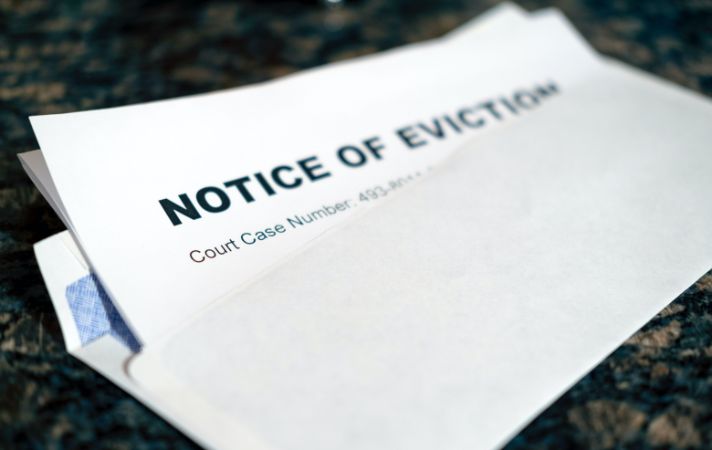Evicting a tenant can bring with it stressful situations and difficult emotions.
It’s a procedure that sometimes is unavoidable as a landlord and it’s important that when the situation arises you handle things in the right manner.
Otherwise, you could land yourself in trouble if you don’t follow the legal process of evicting a tenant.
Our aim with this article is to give you a brief overview of the eviction process. A process that we as civil litigation solicitors deal with on a regular basis.
We’ll also cover some other frequently asked questions that revolve around the eviction process.
**The UK government brought out a new Renters’ Reform Bill on 17th May 2023. The Bill is set to include a series of measures to improve tenant’s rights.
A major change is a ban on Section 21 no-fault evictions. As a result of this, we will update this blog when the Bill becomes law on 1st October 2024.**

How to evict tenants from your property
If you don’t carry out proper procedure then you could be prosecuted for harassing or illegally evicting your tenant.
Before we begin it’s important to note that this information only applies to assured shorthold tenancies (AST). These are the most common tenancies out there and there are two types of AST.
- Fixed-Term Tenancy – This tenancy is for a fixed period of time, typically for 6 months or 12 months, although other durations are possible.
- Periodic Tenancy – A periodic AST does not have a fixed end date. It runs on a rolling basis, often month-to-month or week-to-week, depending on how the rent is paid.
There are other tenancies that aren’t as common as ASTs, including:
- Excluded tenancies or licences.
- Assured Tenancies.
- Regulated Tenancies.
Step 1: Give Notice
The very first step in evicting a tenant is serving them the appropriate notice. This means that you must serve them a Section 21 notice or a Section 8 notice under the Housing Act 1988.
These notices serve different purposes so it’s important to ensure you serve the right one for your particular situation with the necessary accompanying documentation.

Section 21 Notice
Section 21 notices are served when you want to take back possession of the property at the end of the fixed term tenancy, or if there is a break clause in the contract.
You can also serve a section 21 during a tenancy when it is a periodic tenancy which will have no ‘fixed’ end date.
You serve your tenant a section 21 notice to give them ‘notice of possession’. You do not need to give a reason to serve a section 21 notice.
What to Know When Serving a Section 21 Notice:
- The Section 21 notice should be served at least 2 months before the tenant needs to leave the property.
- A section 21 notice cannot be served in the first 4 months of a tenancy agreement. The only time this can happen is if it’s a renewed tenancy agreement in its first 4 months.
- Ensure you’ve given copies of the following information before serving a section 21 notice:
- Energy Performance Certificate.
- Gas Safety Certificate.
- A ‘How to Rent’ guide, which should be given at the start of any new tenancy.
- If a complaint is made by your tenant about your property’s condition, then they may take matters further with the local housing authority should you not deal with it. Any section 21 notice served after the initial complaint will lose its validity once the notice from the local housing authority is served.
- Section 21 notices are valid 6 months from the date they were issued. If possession is not carried out within this timeframe then a new notice will need to be served.

Section 8 Notice
A Section 8 notice can be served at any point in the tenancy if the tenant has broken the tenancy agreement. Which typically involves actions such as:
- Overdue rent.
- Property damage.
- Causing disturbances with neighbours and local authorities.
Schedule 2 of the Housing Act 1988 is where the grounds for serving a section 8 notice can be found.
There is an art to ensuring the correct / relevant information is included and served if appropriate. You must also specify on a section 8 notice the specific terms of the agreement that have been breached with the correct evidence to support.
What to Know When Serving a Section 8 Notice:
- The appropriate notice period for a Section 8 notice is generally between 2 weeks and 2 months.
- A Section 8 notice does not necessarily guarantee eviction. If the tenant refuses to leave the property the case may be brought to court and the ruling may not go your way if there are contentious issues involved and/or allegations of housing disrepair.
Step 2: Apply an Order of Possession
If the tenant is refusing to leave the property then you will need to apply to the court for an order for possession.
There are 2 types of processes for reclaiming possession:
- Standard Possession Claim.
- Accelerated Possession Claim.
Standard Possession Claim
If you’ve served a Section 21 or Section 8 notice and want to claim rent arrears and get your property back then you’ll need to go for a standard possession claim.
- A claim form and particulars of claim must be filed and served.
- The tenant has the opportunity to prepare a defence.
- Witness evidence must thereafter be exchanged.
- The court will list the matter for hearing.
- The hearing could be a final determination hearing and/or a case management conference to give directions to progress the claim further.

The Accelerated Possession Procedure
If your tenant hasn’t left by the specified date of the section 21 notice, you aren’t claiming rent arrears, the necessary paperwork is in place and there is a written tenancy agreement, you can go for an accelerated possession procedure.
This can speed up the process when it comes to claiming back possession of the property. This is due to the fact there is no court hearing.
A comprehensive claim form/particulars of claim must be submitted with the strict required documentation to support, subject to the date the tenancy agreement was entered.
Once the form is submitted the court will send a copy to the tenant which will give them a period of 14 days to reply if they have an objection to the claim.
If successful you will get an order of possession without a court hearing and an order for the tenant to pay the court fee fixed costs. The order of possession is enforceable 14 days after the order is made.
A court hearing could happen if there are questions surrounding the paperwork or if the tenant raise a valid objection. These proceedings usually take 6-10 weeks from the issue of proceedings to receipt of the order of possession.
Step 3: Serve an Order of Possession
If the tenant does not leave the property once the possession order has lapsed, you must request a possession warrant.
Once authorised, this allows a bailiff to carry out the eviction of your tenants.
What to do if a tenant refuses to leave?
If your tenant refuses to leave the property then you will need to apply for an order of possession.
Your options are with a standard possession process or an accelerated possession process.
If your tenant still refuses to leave then you will need to request a possession warrant which involves bailiffs coming to the property and evicting the tenant.
What are the new rules for evicting tenants?
The government has presented its intentions to eliminate section 21 notices and implement a more straightforward tenancy framework, resulting in substantial alterations to the procedure for tenant eviction.
The elimination of section 21 implies that landlords will consistently be required to provide a rationale for terminating a tenancy, such as contractual violations or the desire to sell the property.
Additionally, the government is suggesting the introduction of new Section 8 criteria that would enable landlords to regain possession of their properties when they wish to sell or occupy them personally.
How much does it cost to evict a tenant in the UK?
The expenses involved in the process of evicting your tenant can, in some instances, amount to thousands of pounds.
On average, the cost of evicting a tenant in the UK typically falls within the range of £1,000 to £3,000.
Nevertheless, the total expenses associated with the eviction procedure can vary based on the specific circumstances.
Should you opt to enlist the services of a solicitor, there will be additional legal fees to account for.
When it comes to court fees, pursuing the eviction process through County Courts tends to be more economical in comparison to the High Court.
Filing an application with the court for a standard possession order incurs a fee of £355*, while securing an accelerated possession order (provided you are not seeking rent arrears) comes at a cost of £275*.
If the tenant remains in the property following the issuance of the possession order, the next step involves applying for a warrant for possession, which carries a fee of £130*.
*Prices correct at the time of publication.
How long does it take to evict a tenant in the UK?
The eviction procedure and the process of removing a tenant is generally a quick and smooth one. The majority of tenants vacate the premises after receiving notice, which is the initial step.
When serving a Section 21 notice, you must provide a two-month notice period.
For section 8 notices, the duration of the notice hinges on the grounds for eviction. In cases of rent arrears, which is the most prevalent cause for eviction, the notice period is typically 14 days.
Proceeding to the second step, an order for possession becomes necessary only when tenants disregard the eviction notice.
Anticipate a timeframe of 6-8 weeks on average for a judge to grant a possession order, which grants tenants an additional 14 days to comply.
If your tenants continue to disregard the possession order, you will advance to the third step, involving the application for a warrant for possession. This phase can take anywhere from 5 to 10 weeks.
Brown Turner Ross – Helping you through the eviction process
We understand that going through the eviction process can be a very stressful time for a landlord.
The process can seem daunting but having the right support around you can be vital when trying to achieve the best outcome for your situation.
At Brown Turner Ross we have an expert team of solicitors who are well versed in property law and helping landlords through difficult legal proceedings.
If you’re a landlord and want to find out more about how we can assist you then please don’t hesitate to contact us.
